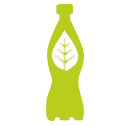Bioplastic
 With volatile oil prices and growing concerns about greenhouse gas emissions, the chemical industry is looking for renewable alternatives to diversify its sources of raw materials. Sugarcane ethanol has emerged as an important ingredient to substitute for petroleum in the production of plastic. These so-called “bioplastics” have the same physical and chemical properties as regular plastic (the most common type is known technically as PET) and maintain full recycling capabilities.
With volatile oil prices and growing concerns about greenhouse gas emissions, the chemical industry is looking for renewable alternatives to diversify its sources of raw materials. Sugarcane ethanol has emerged as an important ingredient to substitute for petroleum in the production of plastic. These so-called “bioplastics” have the same physical and chemical properties as regular plastic (the most common type is known technically as PET) and maintain full recycling capabilities.
BENEFITS OF BIOPLASTICS
• Renewable. Sugarcane polyethylene replaces 30 percent or more of the petroleum that would otherwise be used to manufacture the plastic.
• Lower carbon footprint. Each metric ton of bio – polyethylene produced avoids the emission of 2 to 2.5 metric tons of carbon dioxide on a lifecycle basis.
Use of bioplastics is still developing. But a number of leading companies have established themselves as major players in this emerging area.
AT&T
AT&T was the first U.S. telecom company to use packaging that is composed of up to 30% plant-based materials sourced from sugarcane ethanol. Starting October 2011, the plastic will be used in packaging for AT&T-branded wireless accessories, which includes most device cases and power accessories.
BIOCYCLE
Another form of bioplastic is polyhydroxybutyrate (or PHB), manufactured by PHB Industrial S/A using 100% Brazilian technology. This bioplastic, which goes by the branded name Biocycle, is produced entirely from sugarcane bagasse, making it completely biodegradable and compostable. Biocycle can be used in autoparts, cosmetics packaging, toys, credit cards, cutlery, agricultural parts and more.
BRASKEM
The production of bioplastic in Brazil is led by national petrochemical giant Braskem. The company invested around $290 million to produce 200 thousand metric tons of sucargane-based polyethelene annually in southern Brazil.
COCA-COLA
In 2009, The Coca-Cola Company launched PlantBottle – a bioplastic made with Brazilian sugarcane that the company billed as containing up to 30 percent plant material and being 100 percent recyclable. Since then, Coca-Cola has shipped more than 2.5 billion beverages worldwide using PlantBottle packaging. From the company’s website:
Working with leading academic, government and NGO partners, we scoured the world to find a source for a more environmentally responsible bottle that wouldn’t harm the ecology or people of the region where it is produced, or compete with food. The only source currently meeting these criteria and approved for use in our PlantBottle™ packaging is sugarcane based ethanol from Brazil.
To learn more about PlantBottle, visit Coca-Cola’s website.
The green cleaning brand Ecover announced that starting in the end of April, the company will increase the plant-based content of all its packaging from 30% to 100%, using a renewable plastic called “Plant-astic” that is made from sugarcane.
HEINZ
In February 2011, a strategic partnership was announced by The Coca-Cola Company and the H.J. Heinz Company, which will now use Coca-Cola’s PlantBottle packaging on their world famous Heinz ketchup bottles.
Heinz will introduce 120 million PlantBottle ketchup packages in the United States in June 2011 and has plans to expand its use globally.
Since 2017, IKEA sells re-sealable plastic bags made of 85% sugarcane bioplastic. The shift is expected to save around 75 000 barrels of oil yearly, helping us to reduce our carbon footprint.
JOHNSON & JOHNSON
In December 2011, Johnson & Johnson Brazil launched it’s Brazilian sunscreen line, Sundown, in a new packaging that contains sugarcane-based polyethylene from Braskem. The package contains 60% green plastic and 40% recycled material and all bottles have a “I’m Green” logo on the front and back to inform consumers.
Lego started to use sugarcane bioplastic in 2018 to produce botanical elements such as leaves, bushes and trees. The move is part of the LEGO Group’s commitment to use sustainable materials in core products and packaging by 2030.
NESTLÉ & TETRA PAK
In July 2011, Netlé Brazil, in partnership with Tetra Pak and Braskem, detailed the plans to use polyethylene (PE) produced from sugarcane to make caps for box-type packages of two popular Nestlé milk brands, Ninho and Molico.
The launch represents a landmark for the use of green plastic in the food and beverage packaging industry.
Pantene
Pantene announced on April 2011 that it had started producing its new shampoo and conditioner bottles made primarily from sugarcane. The plant-based plastic will be featured on the Pantene Pro-V Nature Fusion collection and will be initially launched in Western Europe with expansion plans to the rest of the world over the next 2 years.
PETROBRÁS
In early 2011, Brazilian multinational energy company Petrobras signed a 10-year contract to provide 143.8 million liters (38 million gallons) of ethanol per year to Taiwan for the production of bioplastics.
WHAT'S NEW
Sugarcane harvest for South Central Brazil for the second half of November 2020 Read on